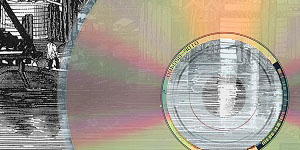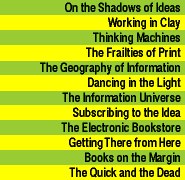


The Geography of Information
None of the changes books are going through today mean that publishers will go away. Currently, about a thousand books a day are published worldwide in all languages. As that number continues to mushroom, publishers can only become more important, not less so. Like librarians, booksellers, and reviewers, they function as stamps of approval, arrangers, and labelers. Without them, or something like them, we would simply drown in information. We would have to spend too much time trying to tell the good from the bad, the useful from the irrelevant, the interesting from the boring, the erotic from the trite.In the future, however, publishers and librarians may not be the only ones who do these things. With the explosive growth in electronic information, a whole new profession may develop---people who find things---perhaps they'll be called ferrets. For those who want to rummage for themselves, there may be another new profession---people who organize things. Maybe they'll be called mapmakers. And everyone will need people who select things, distinguishing the good from the bad; perhaps they'll be called filters.
These three professions mirror the three basic aids currently found in nonfiction books: indices (ferrets), contents pages (mapmakers), and bibliographies (filters). They also correspond to the three basic uses for computers: searching (ferreting), sorting (mapmaking), and selecting (filtering). These are the things that publishers really do, despite their present belief that they're distributors of woodpulp and petroleum.
In the future, your computer may run hundreds of ferret programs, continuously exploring the world's information for useful tidbits. When a ferret returns it may have to face dozens of filters trying to prevent it from adding all the information it found to your personal information base. Information that the filters judge relevant to your interests (and that costs a reasonable amount) is passed to the mapmaker, who links it into your personal map of what's important.
Businesses are more than ready to pay for such precious information. In most corporations today, middle managers play the part of ferrets, mapmakers, and filters for senior managers. The paper reports they often produce, however, are hard to search, index, and compare. Once we commit something to paper it's frozen. We can't display it in other ways---say with histograms, pie charts, or graphs. A table listing national populations alphabetically by country is very annoying when we only want to know the top five populations. The information we seek is there, but it's hard to get at.
Further, the economics and bulk of paper restricts the usefulness of books. Compton's Encyclopedia, for example, now comes on a computer disk that contains almost nine million words; over five thousand articles; almost sixteen thousand photographs, maps, and diagrams; an hour of recorded voices and other sounds; forty-five animated sequences; Webster's Collegiate Dictionary (itself with sixty-five thousand entries); and a word processor. There's no way the publishers could get all that information on paper.
Look, for example, at today's Yellow Pages. To get the most benefit from the book we must understand exactly how the telephone company organized it. We must also have a detailed map, a subway guide, bus routes and schedules, the local Better Business Bureau report, and plenty of time. The phone companies give us no choice because a better Yellow Pages would be far too expensive, bulky, and slow to produce in a paper format. If we do it electronically, however, we can store and update a lot of the same information cheaply and quickly.
To be really useful, Yellow Pages should list all businesses by each street, neighborhood, and mall; by the time needed to get to them from our current location; by whether they're in a safe neighborhood; by their nearness to various landmarks; by whether they're currently having a sale; by whether they accept checks, cash, or credit cards; by their hours of operation; by their nearness to restaurants, gas stations, public restrooms, malls, or anything else we might care about; by their costliness, reliability, revenues, experience, and returns policy; and, finally, by what past customers say about them. The same thing applies to every other kind of business or professional: from doctors to car mechanics, from lawyers to window cleaners. All businesses would pay Yellow Pages to be included in this sort of directory, for the same reason that they presently pay credit card companies---because it could mean more business. Today only 5 percent of the roughly 9.5 million American businesses advertise outside the Yellow Pages.
In thousands of similar ways, paper technology severely limits what we can do, what we can know, and how fast we can learn it. To most Americans, for example, the twenty-five million books in the U.S. Library of Congress, perhaps the nation's greatest intellectual resource, are less useful than a cheap home encyclopedia.